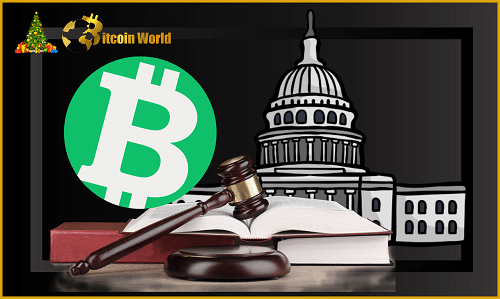2021 was a landmark year for crypto in the United States! If you’re following the world of cryptocurrencies, you know regulation is a hot topic. Well, last year, the US Congress took notice in a big way, introducing a whopping 35 pieces of legislation related to crypto and blockchain. That’s a significant jump, signaling a major shift towards shaping the future of digital assets in America. Let’s dive into what these bills were all about and why they matter to you, whether you’re a seasoned crypto trader or just crypto-curious.
Why the Sudden Focus on Crypto Regulation?
For years, the crypto space operated with relatively little government oversight in the US. But as crypto’s popularity exploded and its market cap soared, Washington started paying closer attention. Think about it – we’re talking about a massive amount of money, new technologies, and potential impacts on everything from finance to national security. It was only a matter of time before lawmakers stepped in to define some ground rules.
The bills introduced in 2021 covered a broad spectrum, but most centered around:
- General Cryptocurrency Regulation: Setting up frameworks for how crypto operates within the US financial system.
- Blockchain Technology: Exploring the vast potential of blockchain beyond just cryptocurrencies and its applications across various sectors.
- Central Bank Digital Currencies (CBDCs): The US government is seriously considering creating its own digital dollar, and these bills explored the possibilities and implications.
The Big Kahuna: The Infrastructure and Investment Jobs Act
You’ve probably heard of this one! The Infrastructure Bill became a major talking point in the crypto world due to its inclusion of a crypto tax provision. Here’s the lowdown:
- Part of a Larger Plan: This bill, championed by President Biden, was primarily focused on upgrading America’s infrastructure – roads, bridges, etc.
- Crypto Tax Rule: To help fund these infrastructure projects, the bill included a tax rule aimed at raising revenue from crypto transactions.
- The Controversy: The specific wording of the crypto tax provision sparked a lot of debate and concern within the crypto community. Many argued it was too broad, unclear, and could unintentionally harm innovation.
|
|
|
Beyond the Infrastructure Bill: Other Notable Crypto Legislation
While the Infrastructure Bill grabbed headlines, several other important crypto-related measures were introduced in Congress in 2021. These bills showcase the diverse approaches lawmakers are considering for regulating the crypto space:
- The Consumer Safety Technology Act: Focused on protecting crypto users. This likely involves measures to combat fraud, scams, and market manipulation in the crypto markets.
- The Blockchain Innovation Act: Aimed at fostering innovation in blockchain technology. This could involve creating a more favorable regulatory environment for blockchain startups and businesses.
- The Digital Taxonomy Act: Deals with defining and classifying digital assets. Clear definitions are crucial for establishing consistent regulations and legal frameworks for different types of crypto assets.
Not Everyone is on Board: Congressional Debates and Pushback
It’s important to remember that these bills are just proposals. There’s significant debate and disagreement within Congress about how to approach crypto regulation. Here’s a glimpse of the different perspectives:
- Opposition to Certain Bills: Some members of Congress voiced strong opposition, particularly to the crypto tax provisions in the Infrastructure Bill. Concerns were raised about the ambiguous wording and potential negative consequences.
- Crypto Advocates in Congress: On the other hand, there are also senators and representatives who are strong supporters of cryptocurrencies. They are advocating for more lenient and innovation-friendly regulations.
- The Push for Clarity: Across the board, there’s a general call for clearer and more well-defined regulations. The ‘cryptic wording’ mentioned in the original article highlights the need for regulations that are practical, enforceable, and don’t unintentionally harm the industry.
CBDCs: The Digital Dollar in Focus
Central Bank Digital Currencies (CBDCs) are a major area of interest for governments worldwide, and the US is no exception. Here’s why they’re a key part of the crypto regulation conversation:
- Staying Competitive: The US government wants to remain at the forefront of financial innovation. Exploring a CBDC is seen as a way to compete with other nations and maintain the dollar’s global standing in an increasingly digital world.
- Careful Approach: However, there’s also a sense of caution. The government doesn’t want to rush into creating a CBDC without fully understanding the implications for monetary policy, financial stability, and privacy. Expect a measured and deliberate approach to CBDC development in the US.
What Does This Mean for the Future of Crypto in the US?
The flurry of crypto legislation in 2021 signals a clear trend: regulation is coming to the crypto space in the US. While the exact shape of these regulations is still evolving, here are some key takeaways:
- Increased Scrutiny: Expect continued and growing scrutiny of the crypto industry from lawmakers and regulators.
- Potential for Clarity: While some initial regulatory attempts may be imperfect, the ongoing dialogue and legislative efforts could ultimately lead to clearer rules of the road for crypto businesses and users.
- Balancing Innovation and Protection: The challenge for lawmakers is to strike a balance between fostering innovation in the crypto space and protecting consumers and the financial system.
- Global Implications: US crypto regulations will likely have a significant impact on the global crypto landscape, given the US’s economic influence.
The journey of crypto regulation in the US is just beginning. Staying informed about these developments is crucial for anyone involved or interested in the world of cryptocurrencies. Keep an eye on legislative updates and engage in the conversation – your voice matters in shaping the future of crypto!

Related Posts – Bank DBS’s Crypto Business Grows Massively Due To Growing Demand From Investors
Disclaimer: The information provided is not trading advice, Bitcoinworld.co.in holds no liability for any investments made based on the information provided on this page. We strongly recommend independent research and/or consultation with a qualified professional before making any investment decisions.


